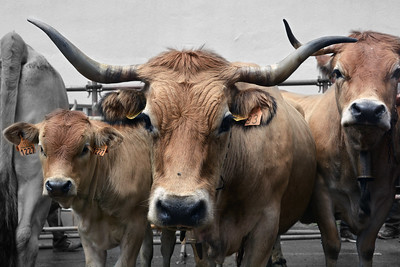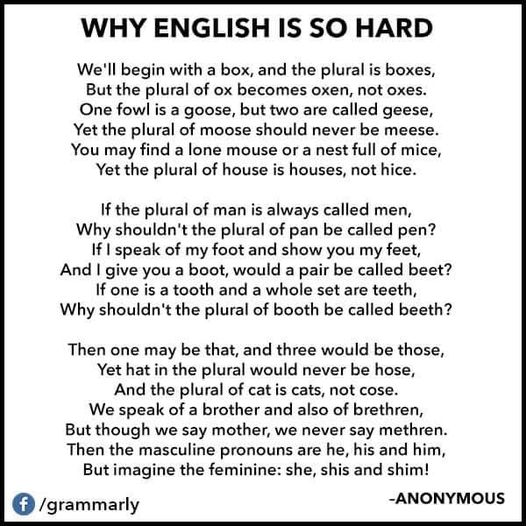
Deze had mijn moeder in de jaren ’80 al op de koelkast hangen, en om de zoveel tijd steekt hij op social media weer de kop op. Het rijmpje dat meestel “why English is so hard” genoemd wordt.

Het rijmpje blijkt nog ouder dan ik had kunnen verzinnen, hij stamt uit minstens 1896! De oorspronkelijke auteur blijkt niet te achterhalen, maar die is intussen toch al dood, gok ik zo, dus die zal het wel niet zo erg vinden, van die social media.
Hier is de oorspronkelijke tekst:
We’ll begin with a box, and the plural is boxes,
But the plural of ox should be oxen, not oxes.
Then one fowl is a goose, but two are called geese,
Yet the plural of moose should never be meese,
You may find a lone mouse or a whole nest of mice,
But the plural of house is houses, not hice.
If the plural of man is always called men,
Why shouldn’t the plural of pan be called pen?
The cow in the plural may be cows or kine,
But a bow if repeated is never called bine,
And the plural of vow is vows, never vine.
If I speak of a foot and you show me your feet,
And I give you a boot would a pair be called beet?
If one is a tooth, and a whole set are teeth,
Why shouldn’t the plural of booth be called beeth?
If the singular’s this and the plural is these,
Should the plural of kiss ever be nicknamed keese?
Then one may be that and three would be those,
Yet hat in the plural would never be hose,
And the plural of cat is cats, not cose.
We speak of a brother, and also of brethren,
But though we say mother, we never say methren,
Then the masculine pronouns are he, his and him,
But imagine the feminine she, shis and shim,
So the English, I think, you all will agree,
Is the queerest language you ever did see.
Zoals je kunt zien is er echt weinig aan veranderd in al die tijd. De paarse stukjes zijin weggehaald (dat laatste stukje staat er meestal wel bij, maar dan met “funniest” in plaats van “queerest”).
Dat het meervoud van “cow” ooit “kine1” was, dat had ik je niet kunnen vertellen, dus ik snap wel dat ze dat stukje hebben weggehaald. En dat “this”, “these”, “kiss”, “keese” dat loopt ook niet helemaal lekker.
Is het terecht?
Mensen die Duits hebben geleerd, of een andere taal waar er flink veel meervouden zijn die je gewoon uit je hoofd moet stampen, vinden dit rijmpje grappig maar halen toch vooral hun schouders op.
De onregelmatige meervouden in het Engels vormen een kort rijtje die de meeste leerlingen vrij snel onder de knie hebben. Echt geen groot probleem, dus.
| foot | feet |
| goose | geese |
| louse | lice |
| die | dice |
| man | men |
| mouse | mice |
| tooth | teeth |
| woman | women (uitspraak: “wimmin”) |
| child | children |
| ox | oxen |
| sheep | sheep |
| fish | fish (“fishes” hoor je steeds vaker) |
| person | people |
Dan heeft het Engels ook nog een paar Latiijnse meervouden, zoals “alumnus – alumni”, maar die zijn voor ons Nederlanders vaak hetzelfde en daarom niet zo moeilijk.
Wikipedia heeft een mooie, complete lijst van Engelse meervouden, waarin ook goed aangegeven staat welke meervouden intussen ook vaak regelmatig gebruikt worden, (zoals “curriculums”) want je hoeft niet moeilijk te doen als het makkelijk kan!
Sunday Funday
Deze site, hoezegjeinhetEngels.nl, bespreekt Nederlandse woorden die moeilijk naar het Engels te vertalen zijn, zoals hoeveelste en zweverig. Maar zondag is het tijd voor ontspanning en dan zet ik een iets leuks op mijn blog dat met taal of cultuur te maken heeft. Want dat is leuk! 😉

Heddwen Newton is an English teacher and a translator from Dutch into English. She thinks about languages way too much, for example about how strange it is that these little blurb things are written in the third person.
Heddwen has two children, two passports, two smartphones, two arms, two legs, and two email newsletters.
English and the Dutch examines all the ways Dutch speakers interact with the English language. It has almost 1700 subscribers and is growing every day. Sign up here.
English in Progress is about how the English language is evolving and how it is spoken around the world. It has more than 2600 subscribers and is growing every day. Sign up here.
Meer lezen? GA NAAR EEN WILLEKEURIG ARTIKEL
1 Taalkunde nerdhoekje: “kine” is een dubbel-meervoud, zoals bij ons kind – kinderen. De oorspronkelijke meervoud was onregelmatig (kind – kinder, zoals in het Duits) en daar werd toen een -en achteraan gezet. In het geval van “kine” was cow vroeger “cu” met de meervoudsvorm “cy” (vergelijk Duits: Kuh – Kühe). Achter dat “cy” werd een n gezet “cyn”, en dat werd later “kine”. Het doet me denken aan “poxes” waarover ik een tijdje geleden schreef. Die meervoudsvorm “kine” wordt tegenwoordig nooit meer gebruikt in het Engels, je zegt gewoon “cows”.